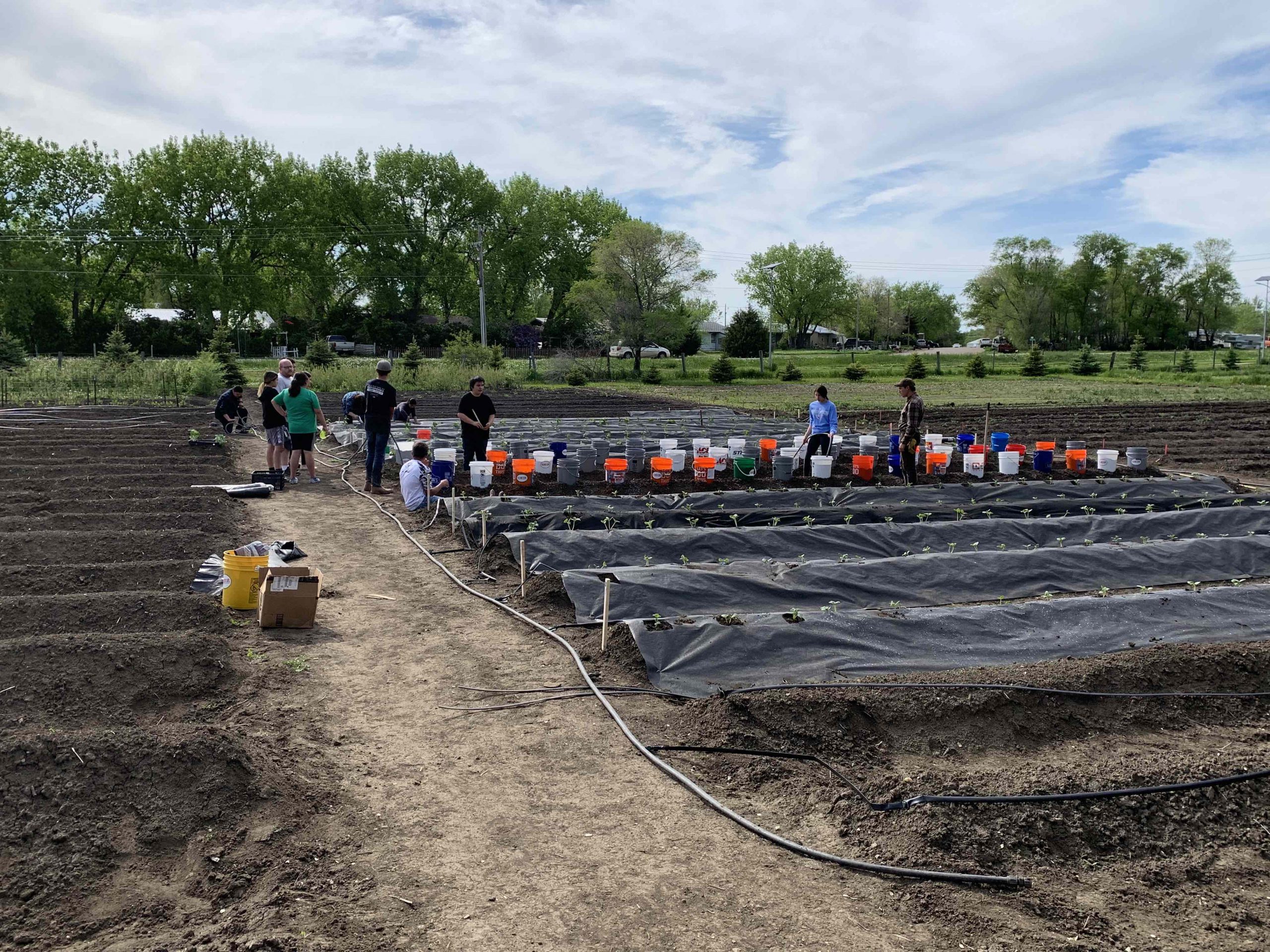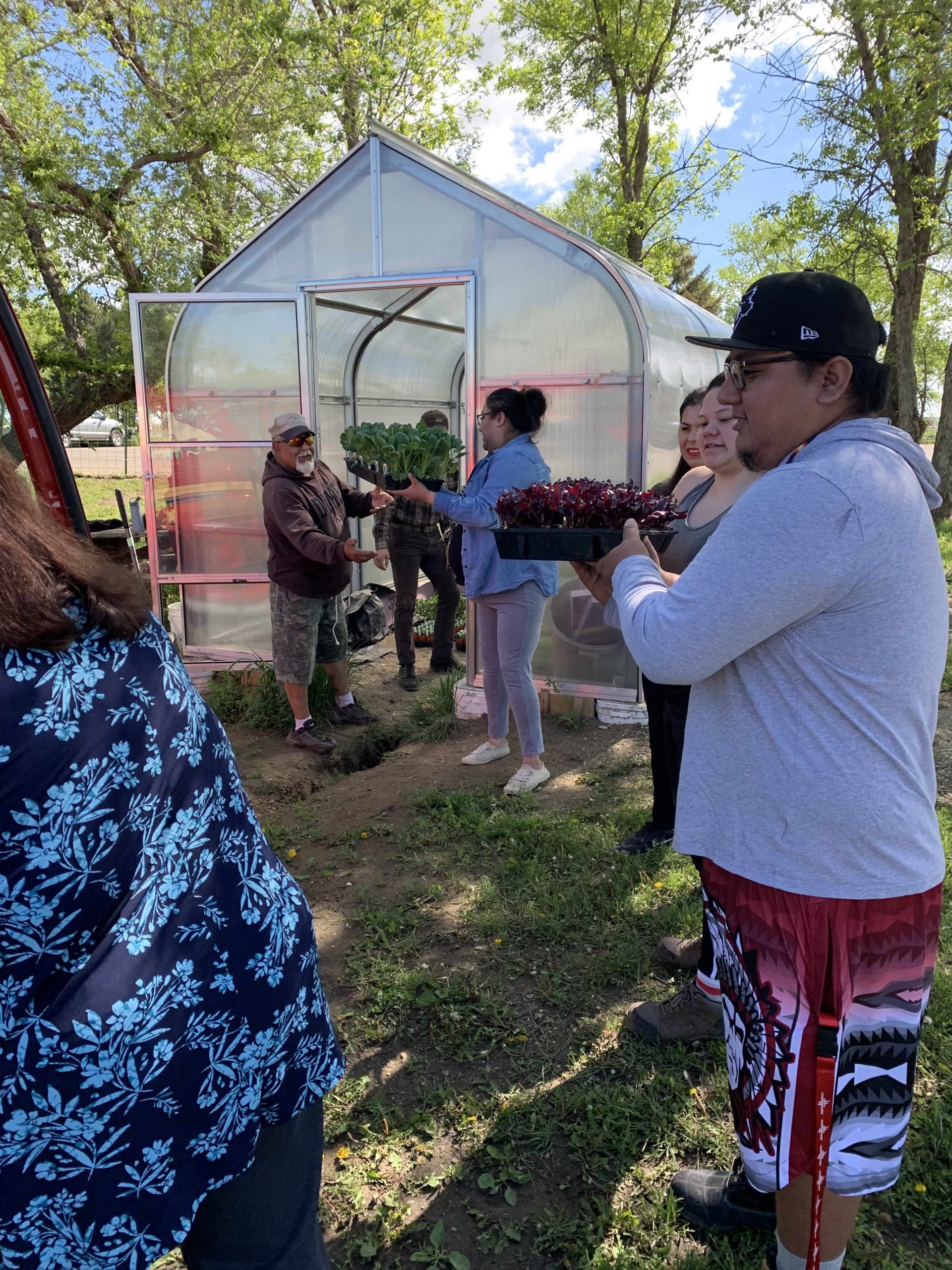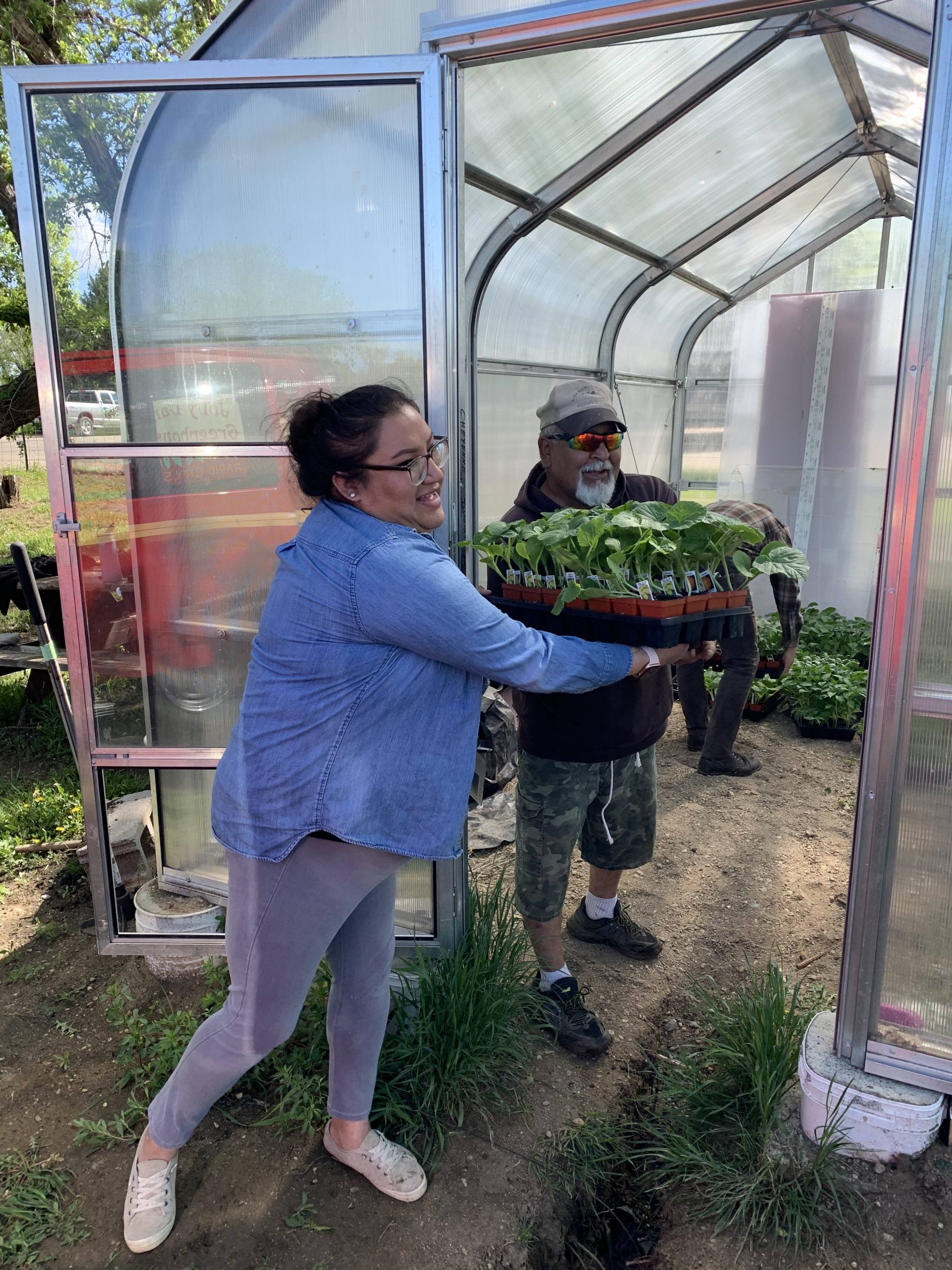Indianz.Com > COVID-19 > Cheyenne River Youth Project (South Dakota)
Posted: June 10, 2020

Planting container potatoes in CRYP’s Winyan Toka Win Garden. Photo courtesy Cheyenne River Youth Project
FOR IMMEDIATE RELEASE
EAGLE BUTTE, SD (June 10, 2020) — June is off to a busy start at the Cheyenne River Youth Project, located in the heart of South Dakota’s remote Cheyenne River Sioux Reservation. Every day, staff members have been busy planting crops in their 2.5-acre, pesticide-free Winyan Toka Win (Leading Lady) Garden.
So far, the CRYP team has planted sweet, trident and jalapeño peppers; cucumbers; tomatoes; cabbage; and potatoes, including three rows of container potatoes. They also planted 44 wild grape trees.
“Our goal is to establish an orchard with chokecherries, sand cherries, wild plums, and wild grapes,” said Julie Garreau, CRYP’s executive director. “It’s a lot of work, but it will be worth it to bring so many of our traditional Lakota foods to our campus—and to our kids.”

The CRYP staff works together every day in the Winyan Toka Win Garden to ensure a bountiful 2020 harvest. Photo courtesy Cheyenne River Youth Project
Native food sovereignty has always been an important pillar in CRYP’s mission and programming. According to Garreau, however, the Covid-19 pandemic has also made it critical to consider food insecurity issues.
“I am of the belief that this will happen again, so we need to have a vision moving forward regarding how we are going to take care of ourselves when it does,” she explained. “We are able to have a stronger focus on the garden this season due to the necessary limitations on the rest of our youth programming and our teen internships. It makes us sad, because we really want our kids back, but we must protect our people, so we’re embracing this opportunity to put our energy into growing nutritious food for our community.”
The Winyan Toka Win Garden lies at the heart of CRYP’s Native Food Sovereignty initiatives. It serves as an outdoor classroom for The Main’s Garden Club and the Native Food Sovereignty Teen Internship, as well as for food-related classes and workshops for the public.
CRYP uses the garden’s produce in daily meals and snacks for local children and teens, menu items in the farm-to-table Keya Cafe, and gift items in the Keya Gift Shop. Proceeds from cafe and gift shop purchases directly support the youth project’s programming and services.

Cheyenne River elder Wayne Garreau with CRYP Youth Programs Director Jerica Widow. Photo courtesy Cheyenne River Youth Project
The organization also shares produce with Cheyenne River elders, and makes it available to the community through the seasonal, weekly Leading Lady Farmers Market.
“When I look at the garden, I can see all the love that’s going into it,” said Jerica Widow, CRYP’s youth programs director. “That makes me feel very good.”
Although the CRYP staff normally depends on volunteer support throughout the growing season, all summer volunteer service groups are cancelled. Garreau noted that a successful harvest entirely depends on her team, and she said they are rising to the occasion.
“I’m so proud of them for giving their all during this crisis,” she said. “We’ll be stronger than ever, when this is over. We know that, and we know that our kids need to see our garden thriving. It’s a symbol of hope for the future, and it lets them know that we’re always going to be here for them.”
Those who wish to support CRYP’s Covid-19 programs and services can make online contributions by visiting lakotayouth.org/donate, and clicking “Covid-19 Relief Fund” or “Winyan Toka Win Garden.” Call the offices at (605) 963-8200 for more information.
To stay up to date on the latest CRYP news and events, follow the youth project on Facebook (/LakotaYouth), Twitter (@LakotaYouth) and Instagram (@lakotayouth and @waniyetuwowapi).
The Cheyenne River Youth Project, founded in 1988, is a grassroots, not-for-profit organization dedicated to providing the youth of the Cheyenne River reservation with access to a vibrant and secure future through a wide variety of culturally sensitive and enduring programs, projects and facilities that ensure strong, self-sufficient families and communities.
Join the Conversation
Search
Advertisement
Filed Under
Tags
More in COVID-19
Tuba City Regional Health Care Corporation (Navajo Nation)
HHS Small Ambulatory Program Awards $55 Million to 15 Tribes and Tribal Organizations (Indian Health Service)
Indian Health Service Announces New Deputy Director for Quality Health Care and Enterprise Risk Management (Indian Health Service)
Federal Emergency Management Agency (FEMA)
White House Office of Management and Budget (Joe Biden Administration)
Tuba City Regional Health Care Corporation (Arizona, Navajo Nation)
Oklahoma City Indian Clinic (OKCIC)
Indian Health Service (Department of Health and Human Services)
Navajo Nation Town Hall (Arizona, New Mexico, Utah)
Navajo Nation (Arizona, New Mexico, Utah)
Tribal organizations statement on advance appropriations for Indian Health Service
Indian Health Service Statement on Advance Appropriations (Department of Health and Human Services)
Indian Health Service (Department of Health and Human Services)
Indian Health Service (Department of Health and Human Services)
Navajo Nation (Arizona, New Mexico, Utah)
HHS Small Ambulatory Program Awards $55 Million to 15 Tribes and Tribal Organizations (Indian Health Service)
Indian Health Service Announces New Deputy Director for Quality Health Care and Enterprise Risk Management (Indian Health Service)
Federal Emergency Management Agency (FEMA)
White House Office of Management and Budget (Joe Biden Administration)
Tuba City Regional Health Care Corporation (Arizona, Navajo Nation)
Oklahoma City Indian Clinic (OKCIC)
Indian Health Service (Department of Health and Human Services)
Navajo Nation Town Hall (Arizona, New Mexico, Utah)
Navajo Nation (Arizona, New Mexico, Utah)
Tribal organizations statement on advance appropriations for Indian Health Service
Indian Health Service Statement on Advance Appropriations (Department of Health and Human Services)
Indian Health Service (Department of Health and Human Services)
Indian Health Service (Department of Health and Human Services)
Navajo Nation (Arizona, New Mexico, Utah)
